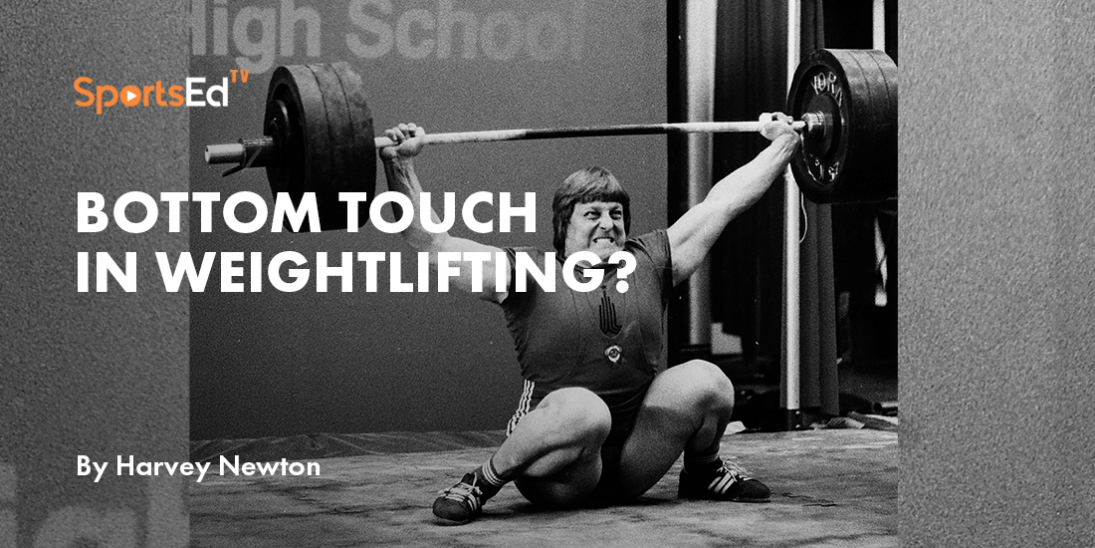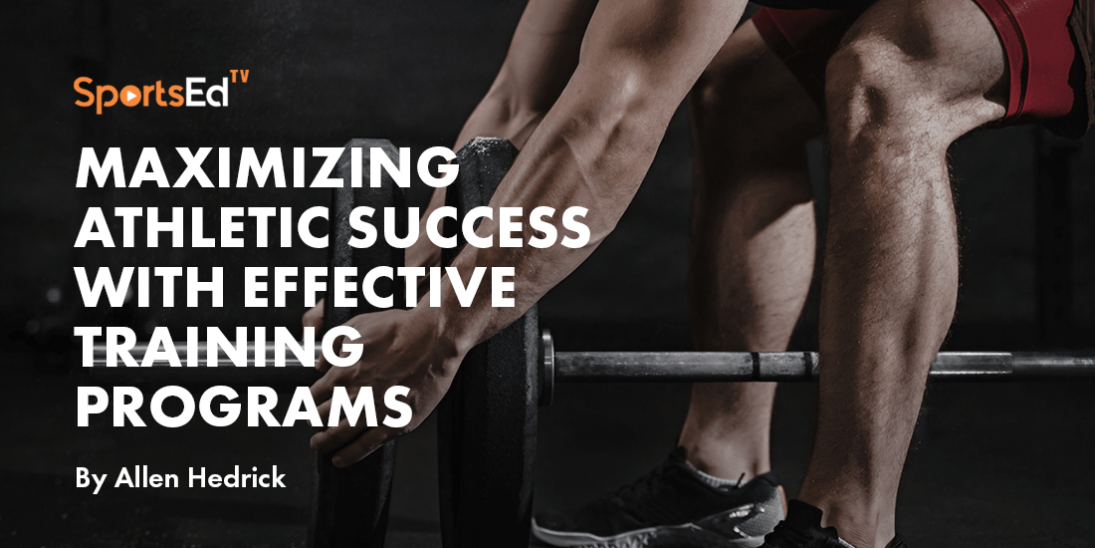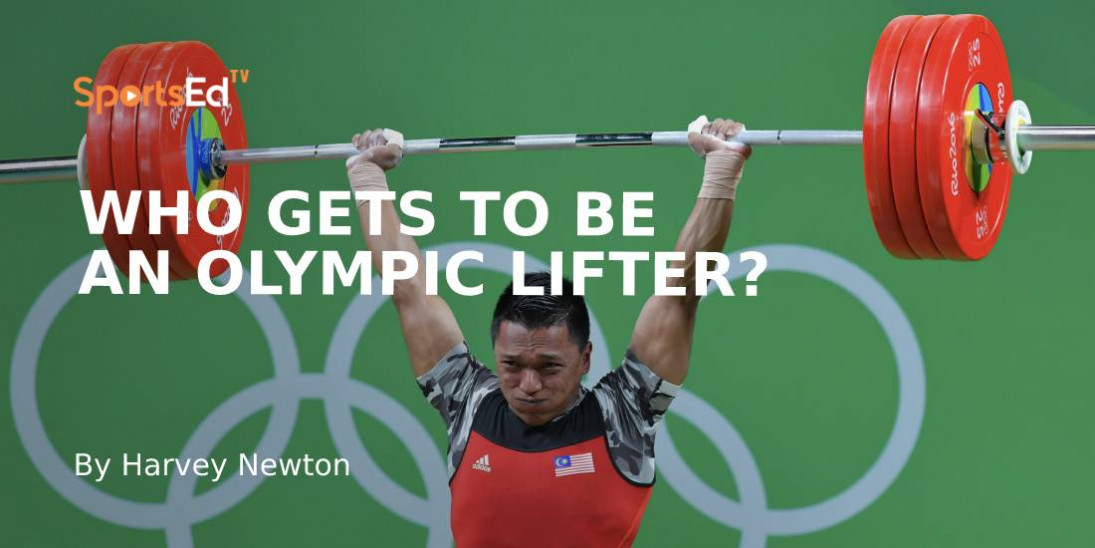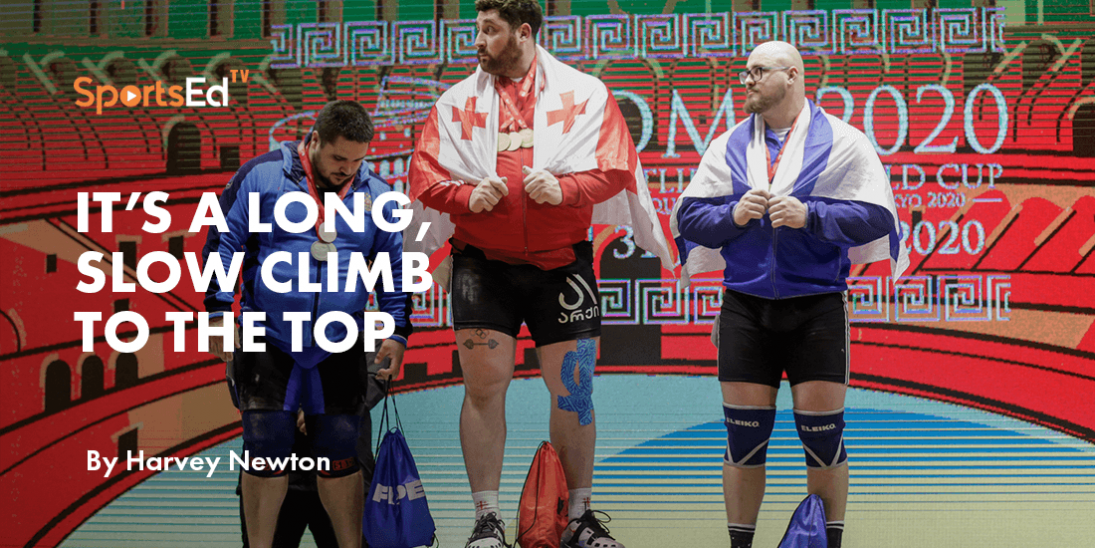Weightlifting
Welcome and thanks for visiting...

Germany’s Elisabeth Oehler Interviewed
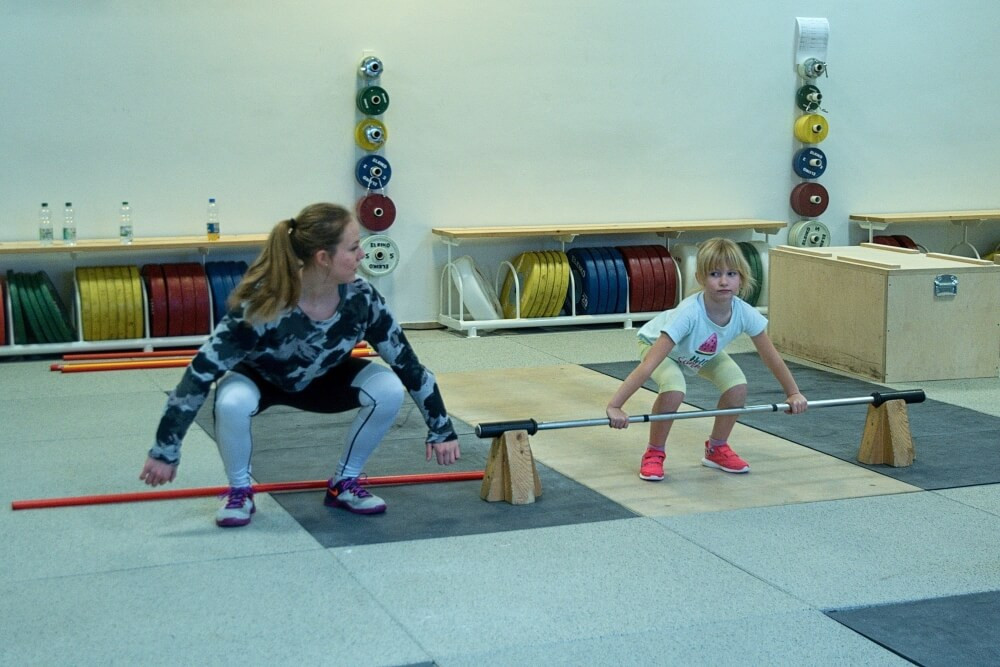
What’s the best age to begin specializing in weightlifting? What about technique competitions for the youngest lifters? SportsEdTV recently interviewed Elisabeth Oehler, the youth development director for the German Weightlifting Federation. Coach Oehler presents some very interesting perspectives on how the Germans approach the development of weightlifters. Below the video with the entire Zoom session, you can read the edited transcript of that hour-long interview.
Harvey Newton (host): Today’s SportsEdTV blog and Zoom meeting is with Elisabeth Oehler of Germany, a young coach who's having quite an impact on both the German lifting scene and perhaps on CrossFit, and with us here in the States. So, Elisabeth, welcome and happy to see you.
EO: Thank you very much. Happy to be here.
HN: I'm going to give you some very brief questions. I hope that you give as long an answer as you wish. But tell us a little bit about yourself, how you got into this position. It's very impressive that you not only work with the federation in Germany, but it also looks like you have a couple of your own initiatives on the side.
EO: That's true. My name is Elisabeth, I'm a bit older than I look. I'm 28 and yes, I work as a coach for the German Weightlifting Federation.
At the moment, I'm responsible for the talent identification and the recruitment process for the Federation. Before that, I was the secretary-general of the youth department and I was mainly responsible for getting kids into weightlifting, and especially getting kids into weightlifting at schools. Now I'm more into the elite high-performance part of the federation. I started weightlifting six or seven years ago in CrossFit, where many, especially female, weightlifters begin. They find they like weightlifting better than CrossFit, especially for lighter bodyweight girls. I switched to weightlifting.
We have a pretty cool mixed gender competition league in Germany called Bundesliga. We have team competitions where females and males compete together in clubs against other clubs. And I was good enough to make it in one of the teams. So that's how I got hooked up with weightlifting. I started very late. I was always more into coaching and especially into coaching kids and young athletes.
I had the opportunity to work with the German Weightlifting Federation and that's where I have been for the last 10 years.
HN: That's great. There are so many topics that you just brought up. I wanted to ask about the league situation because I know German weightlifting has always been based on such participation. That's something that we don't have in this country. We have clubs, but not leagues.
EO: We have the first league, that's the highest league, with a mix of professional national team and foreign weightlifters. We have a lot of foreigners who lift in the league. And a huge part of it is also amateur weightlifters who just do it for fun. And they are basically competing for the clubs in a team of six athletes. That’s the first Bundesliga or the first league. It's all over the country.
We have a team from Berlin competing against a team from here in the Heidelberg area. The first travels around 700 and 800 kilometers. We have a second league that's completely amateur and they have regions where they compete, with playoffs after the league when they compete against teams from other parts of Germany.
It's a good way to have everyone competing on a regular basis. You can start competing in the leagues at 16 years of age. I think we have competitors over 40 who compete in the masters’ competition. It brings everyone together.
HN: Thank you very much for describing it so completely. The United States is a very large country. The travel and expenses sometimes could be negated with more of a regional focus.
Did you come from a sports background prior to CrossFit?
EO: Not from an elite sports background. I've always done a lot of different sports. I tried playing basketball, but I'm way too short. I tried handball (note: the Olympic sport). What I experienced has had a huge impact on how I coach now. I'm really into multi-sports for kids and youth athletes, instead of specializing early. It worked for me and I think it works for a lot of other athletes as well. I've never been an elite weightlifter.
We want lots of general preparation before specialization. But sometimes the system doesn't allow it. Unfortunately, I would prefer to have less high-performance emphasis early on and have involvement with other sports. But specialization is where the sports world is at present. I know it's different in the US because of the high school and college system. We don't have that here. We sometimes have kids eight or nine years old coming to specialize in weightlifting. And it's not what I would support.
HN: I want to revisit that question a little later in the interview. I remember some years ago, Frank Mantek gave a several-day presentation at our Olympic Training Center. One of the questions that came up was what you just described. He's looking at adult performance at the Olympics, but there's another group that's looking for junior world championship results.
What drew you to CrossFit?
EO: There were a few people working out, doing CrossFit. It was back in the days where you didn't have all these fancy “boxes.” We just worked out in a park in Berlin. I liked the social space and people. The social aspect was the main reason to go into CrossFit. I never enjoyed those “metcons” and being completely done after 45 minutes. I never really enjoyed that, but I enjoyed working with other people. This was during my studies; it was very easy to get some exercise in.
HN: In our USAW coaches' education programs many of the participants have been from CrossFit. I’ve asked many box owners, and they agree, CrossFit often includes 60% female, 40% male. They all agree that the social aspect is one of the anchors that keeps the program going.
EO: It is very nice to see that quite a huge variety of female bodies at CrossFit enjoy being muscular and strong. CrossFit did a lot for female strength athletes. I don't have to apologize for being maybe a bit bigger. In a commercial gym when you go heavy everyone's looking at you like you're some kind of stranger. I think for a lot of females, it's quite cool how CrossFit encourages these strong personalities.
HN: It's been a great evolutionary process to watch. Mike Burgener first mentioned CrossFit to me around 2000. I remember saying, “What is CrossFit?” But by 2008 I had seen the impact and I was watching many participants come through our program. They wanted to learn to lift. I'm not sure they wanted to learn to be coaches, but they wanted to know more about snatches and C&J. It's been an interesting process. I would say this, Elisabeth: CrossFit has had a huge impact on weightlifting in this country. We now have thousands of lifters at national championships, rather than a couple of hundred. Have you seen the same impact on the sport of weightlifting in Germany? Is there a lot of transition from CrossFit weightlifting to real competitive weightlifting?
EO: Actually, yes, we have huge numbers now in the German championships, and in the regional competitions and the leagues. CrossFitters use our club system to get better at weightlifting. We like having greater numbers and a lot more interest into weightlifting, especially for our coaching courses. They are full of people and box owners of CrossFit.
We don't really see a benefit from this in high-level performance. I work in recruiting and talent identification for weightlifting. We thought CrossFit would produce top lifters, but especially for male weightlifters, that's not the case. We haven't found a single one who would meet the national standards that we have. There are a few females that have potential. Maybe CrossFit teens will develop what we need, but not the older ones. The level of CrossFit in Germany is not as good as in the U.S.
HN: I have done some statistics comparing our national championships in the ‘90s, in the early 2000s, and then currently. It appears that over time we have more weightlifters lifting less weight.
But there is a gender difference. CrossFit females have had a positive impact on our high-performance programs. CrossFit has really brought to the sport women who are in much better physical condition and they go to the top much quicker. But as you said, we don't see this with the men.
How would you view the sport of weightlifting in Germany today? Germany certainly had a very rich history dating back to the earliest days and you’ve had champions as recently as ‘08 with Steiner.
EO: We have athletes qualifying for the Olympic Games. I think someone like Mathias Steiner is a once-in-a-century victory. I think that's not repeatable with the system, especially if you know the whole story behind it and what made him win the Olympics in 2008. The generation that we are dealing with now is a bit different. And we don't really have many athletes in the higher weight classes anymore. We are more active in the lower weight classes. We have guys qualifying for the Olympics next year at 61kg, 73kg, and 81kg, but we don't really have the heavier guys anymore. If I look into our youth national teams, we don't really have the superheavyweights that we were famous for. We always had good superheavyweights, like Ronny Weller, and many others.
But I don't know if it's maybe the generation that we are dealing with now but having a career in an Olympic sport is not what they really want anymore. I see that with a lot of youth athletes. They have so many options now; choosing weightlifting or choosing an Olympic sport where you have to train so hard in a way, you have to sacrifice so much to make it to the top, is not really something they choose anymore. It's very rare that we find young athletes who are willing to go that way with us.
HN: Yeah, that's a great explanation. Germany has been on top in the past, the US has been on top in the past, but we’re not there today. It's interesting to compare notes with a good neighbor, thank you.
I want to switch a little bit to coaching, because you obviously enjoy coaching. You've been tasked with specifically coaching youth, as you said, talent identification. I'd like you to discuss that. Also, please explain the coaching scheme in Germany.
Years ago, when I was with USA Weightlifting, we used something from Germany that involved a long jump, a two-hand backward toss of a shot-put over the head, and some other general fitness measures. Some parties now say, “Yes, talent identification is important, but our problem has been we find lots of very good talent, but we can't get them into weightlifting.”
I don't know whether you have the same frustration; sometimes you see someone with potential, but then they say, “I'm going to go get a job or to some other sport.”
EO: I think we have the same problem. I was all about having great tests to identify talent for weightlifting. But I found out very quickly that we don't really see talent before they are at least 18, 19, 20 years old. In the younger age groups, it's basically, do they have athletic talent? Do they have mobility? Are they explosive?
For weightlifting, they need a lot of willpower and to be very dedicated to training. It's not just a physical part, but it's the mental part as well. Are they willing to sacrifice a lot to make it to the top or not? I always find a lot of kids who are explosive and already have good leg strength, for example. They often say, “I'm already doing another sport.” For me, it's very frustrating with powerlifters because, especially women, say, “It's much easier for me to be successful in powerlifting.”
It's frustrating to see talented athletes that go to different sports, or to school, or university and stop training completely. I think you can study and train at the same time and be successful if you manage well and have a coach who supports you.
HN: Do your national team members receive financial support or are they having to work a regular job during the day?
EO: All of the athletes on the national team have support. We only have a handful that work a regular job, the rest are either supported by the military, the police, etc.
The decision between weightlifting and studying or weightlifting and a job, that's really just for those who don't have the potential. Everyone who has potential here in Germany gets the funding and the support they need. They really get a lot support, especially from the German Olympic Sports Confederation.
HN: As you mentioned earlier, in the US many Olympic athletes come from university sports. Our university weightlifting program is rather small, being considered a club, rather than a team, activity. The sport is not recognized by the college governing body.
EO: For university students, we have special people working at the Olympic training centers. They are career advisors. They help students manage studying and training at the same time. Also, these students are allowed to take longer to complete their studies. No one pays study fees, so that's not an issue here.
HN: Interesting. How about the development of coaches?
EO: I think most younger coaches have the same story as I do. I actually started coaching kids and weightlifting in schools. I did it on a volunteer basis for two years. The federation liked what I was doing. They were very supportive with coaching education.
My boss said, “We can help you to grow and develop as a coach. We like what you're doing. We are going to support you in whatever you need to grow as a coach.” I'm trying to do that with other coaches as well while I'm still very young. I grow coaching on a mentoring basis. That's a bit better than having a lot of formal education. Reflect on their work and help when they have a problem with an athlete. We especially try to support younger coaches.
HN: In this country, many of our weightlifting coaches do not have degrees in sports science. Someone may a fine arts degree, but they want to be a coach. We don't really have a pathway for educating coaches and it becomes almost more of self-education. One, does Germany have this situation? Two, you mentioned starting by volunteering to coach. Had you been through any sort of certification program at that point?
EO: Like I said, we have three different kinds of licenses in German weightlifting: A, B, and C. C is for working with youth athletes and kids. B is working with any sport. The A license is for those working with elite athletes. I had done the C license phase before I started coaching. I don't want to coach without having the proper education. It took a few months to get C.
This included sport-specific knowledge for weightlifting, along with some coaching science, and nutrition. Then I got a job at the weightlifting federation, so I thought it's time for me to study again. It's my obligation toward my athletes to have the best knowledge and to always grow and develop.
I started 10 years ago, studying sports science, along with my full-time job. It's been quite a hassle. It's a lot of work besides a full-time job. I did it through our program from the German Olympic Sports Confederation. They have a cooperation with a university for coaches that work in sports, but who haven't studied sports science. I was able to do a lot of projects for the university in cooperation with German weightlifting, which was really, really great.
HN: You've mentioned a couple of times full-time work. Is that considered weightlifting, or do you have another job?
EO: No, I worked full time, 40 hours a week, for weightlifting.
HN: We started with the Olympic Games and world championships, then that evolved to including a junior world championship in 1975. Now we have the Youth Olympics, along with the Youth World Championships, and the Youth Continental Championships.
We're asking more of the younger athletes. In weightlifting, the old data indicated it takes about 10 years to mature into a solid weightlifter who can compete at the elite level at the Olympic Games. Well, if you start at eight, you're finished at 18. We see lots of youth emphasis for many American sports, such as baseball’s Little League or Pop Warner football. Playing team sports is different from taking part in individual sports. You can expect a lot of team sports at an early age to remain focused on having fun.
I’m not convinced youth should specialize in individual sports like weightlifting. A young lifter is required to go out on the platform alone and compete against the barbell. I'm not sure the young mind is prepared to deal realistically with the pressure of immediate success or failure on the platform. Many coaches and parents seem to have great expectations of what some youngsters can do versus looking long-range at what could be achieved in the future. Your thoughts?
EO: I see the problem, especially having Youth European or World Championships, is that supports early specialization. It encourages young athletes to just lift and nothing else.
We made a decision two years ago to not send any of our athletes to the U-15 European or World Championships. We don't send anyone to the Youth World Championships in general. The first time they can go to an international competition is for the U- 17. We try to have quite high standards for that. We monitor the youth athletes that go to the European Youth Championships. I would be fine if we didn't send anyone to the Youth World or European Championships at all.
It's fine if they started at the junior level. I understand why a lot of weightlifting clubs, especially in Germany, are looking for very young kids, sometimes eight, nine, 10 years old to start weightlifting. But it's a very long way. We consider the peak age in weightlifting now to be between 25 and 28. A young lifter specializing at eight years has 20 years to stay in a sport that has just the snatch and the C&J. How do you motivate them over such a long period of time? How do you get the body to adapt further?
I would prefer having kids not specializing in weightlifting until they are 18. Let them also do other sports. They certainly can learn technique at an early age. Lower body strength and technique, that’s what they need. The rest we develop later. I'm not very supportive of all these youth competitions that are just focused on a total.
HN: Those are beautiful answers, thank you. From my earlier days with weightlifting, it seemed the Germans experimented with technique competitions. For younger lifters, we've had great debates on this subject. First, we don't have coaches that agree on what is standard technique. How to judge? We're not figure skating, gymnastics, or diving; our judges are not trained to evaluate technique. Do you have technique competitions in Germany?
EO: Yeah, we still have. The youth athletes can compete on a national level when they are 13, 14, and 15. They do a total and get technique points from the judges. They also do some basic athletic exercises like long jump, a medicine ball throw, and pull-ups.
But you must have acceptance of the coaches and the judges as to certain standards. There’s a lot of educating the judges and the coaches. I've seen quite a few times where kids come off the platform receiving point deductions due to bad technique. The shame is the coach tells them it doesn't matter. “Next year you're 16, and then technique doesn't matter anymore.”
Oh, for my heart, that's so wrong. From a coaching point of view, telling your 15-year old that technique won’t matter when you're 16 is shameful. In order to have technique competitions coaches must support this. If coaches don't support it, it doesn't work.
It's a lot of effort for the federation to get the judges and everyone else involved in this whole process coordinated.
HN: Very good answer, thank you, we're on the same page.
Are you seeing during the current times of this pandemic that you're having to change any of the training or competition expectations? I know we still are not certain whether competitions will exist this year. What are you experiencing?
EO: Basically, all national teams and groups at the Olympic training center, have been training since the middle of May. So that's quite a long time. We have a lot of training groups that have done small (training) competitions in their training centers. We are not fully back to having normal competitions. We have the German youth and German junior championships at the end of the year, but we are not sure if they are going to take place. From my point of view, I like the break.
From the middle of March to the middle of May was actually very good for our youth athletes. We had a lot of youth athletes coming back from just doing home workouts, along with other stuff, and focusing on school. A lot of them tried sprint work outside or doing circuits at home. I think the break, doing something else, and getting their head off sport was actually quite good for a lot of athletes.
HN: You mentioned earlier leg strength, and I certainly agree with you. Before our appointment, I Googled German weightlifting program and noted nearly the entire first page dealt with bodybuilding sites talking about “the magic German program” of squatting 10 sets of 10 reps.
I remember first hearing of this concept in the early 1980s when I was the USA national coach. I concluded this was very hard training, certain to promote a lot of lower body hypertrophy. I never could find out details. We are certainly not going to do this with snatch or clean-and-jerk. But, is this still promoted in Germany?
EO: A lot of people took it out of context. The funny thing is, the guy who introduced it used to be my coach. He always said he only suggested 10 sets of 10 reps only for the younger boys (before women's weightlifting). This was for the off-season kids who had to gain weight and go up a weight class to compete. That's the ONLY way he did it. Everyone took it completely out of context. I don't think any lifter does more than 10 reps or not even five sets of 10 reps. I think that's very outdated.
HN: It is part of the problem with the internet today. Elisabeth, I appreciate your insights. While preparing I went to the German Federation site to see what was going on. Years ago, I bought the technique posters with Huster and Caruso. I have those up in my training room now.
I know the times have changed, but the German team always wore Adidas. I noticed in the store that everything seemed to be very heavy on the Nike side of things. I wondered if you're in a position to comment on the national team outfitting. I ask because we have on the SportsEdTV website a blog about shoes. And I think Nike and Adidas both make very good shoes, and no doubt some others do as well.
EO: Nike is the national team sponsor. I think most athletes preferred the new order. I know a few of the older athletes still have the old Adidas with the wooden soles. A lot of people say this one was the best. We leave shoe choice mainly to what the athlete prefers.
HN: We saw a great amount of growth in the US market for barbells, racks, and certainly for shoes as new people came to the sport. Do your young lifters start off with lifting shoes, or do they use more general footwear?
EO: I think the youth athletes don't really need special shoes. They have the ankle mobility, so they should just find stable shoes. People make a lot of fuss about equipment, having the perfect shoes, and having knee sleeves and wrist wraps. I don't really get it.
HN: Well, Elisabeth, you've given us a very fresh perspective on things in Germany. SportsEdTV has a very big impact around the world, huge numbers. We'll have a whole new library of weightlifting exercises up within about a month. How can someone get in contact with you? How can we help promote what you're doing?
EO: I have a website (www.eo-performance.com). Just send me an email. I'm always very interested in discussing strength training for youth athletes. I think it's a great way to introduce barbells into soccer, rugby, swimming, or any other sport. If you are interested in that, just contact me. I'm always very happy to help with the programs for kids.
HN: We will certainly include links within the blog. It is a real pleasure to meet you, and I hope we get a chance to meet sometime near the platform. In the meantime, you're going to contribute to SportsEdTV periodically. Certainly, we wish you the best in your career. Thank you.

